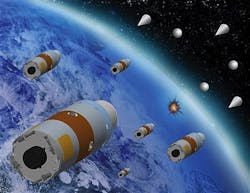Raytheon and Lockheed Martin to design weapon to kill several incoming missile warheads
Officials of the Missile Defense Agency (MDA) in Huntsville, Ala., announced separate contracts Tuesday to the Lockheed Martin Corp. Space Systems Co. in Sunnyvale, Calif., and to the Raytheon Co. Missile Systems segment in Tucson, Ariz., to start designing the Multi-Object Kill Vehicle (MOKV).
The MOKV could engage several incoming objects simultaneously with kill vehicles that could communicate with one another. Raytheon and Lockheed Martin will define a concept that can destroy several incoming warheads and decoys by considering advanced sensor, divert and attitude control, and communication concepts.
The companies will define proof-of-concept prototypes, demonstrate risk mitigation steps for all critical components, assess the technical maturity of their concepts, and rank enabling technologies to minimize design risks. Raytheon's contract is for $9.8 million, and Lockheed Martin's contract is for $9.7 million.
The MDA’s ground-based interceptor missiles today carry one kill warhead that detects, tracks, and attacks an incoming enemy ballistic missile warhead and attempts to destroy it kinetically by force of impact.
Related: Missile Defense Agency looks to IDT to provide test equipment for ballistic missile defense
The MOKV, instead, would launch on one air-defense missile, and deploy several kill vehicles that could engage several incoming enemy warheads. MOKV warheads will be designed to communicate with one another to coordinate their attacks.
The MOKV would function similarly to the MDA's Multiple Kill Vehicle (MKV) program, which was cancelled in 2009. The MOKV is likely to launch on rockets like the U.S. Navy Raytheon SM-3 standard shipboard missile.
On these contracts Raytheon will do the work in Tucson, Ariz., and Lockheed Martin will do the work in Sunnyvale, Calif. Both companies should be finished by May 2016.
For more information contact Raytheon Missile Systems online at www.raytheon.com, Lockheed Martin Space Systems at www.lockheedmartin.com/us/ssc, or the Missile Defense Agency at www.mda.mil.
